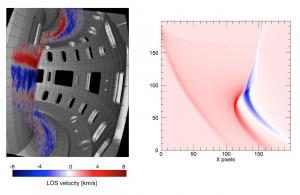Computer-Aided Design
A new platform with Australia
20 Nov 2017
-
Martin Kocan, Port Plugs & Diagnostics Integration Division
In September 2016, the signature of a Cooperation Agreement between the Australian Nuclear Science and Technology Organisation (ANSTO) and the ITER Organization paved the way for Australian participation in the ITER Project. In the first Implementing Agreement of the collaboration, scientists from both organizations and the Australian National University will be joining forces to design the Doppler coherence imaging diagnostic and in particular establish the infrastructure necessary to work with ITER.
Boundary flow measurements in the DIII-D tokamak (left) and the synthetic (expected or "modelled") image plasma flow measurements in ITER (right). These measurements will help in understanding heat and particle transport in ITER.
The Doppler coherence imaging diagnostic is part of operational systems and will be used in ITER to deliver detailed images of plasma flows, temperatures, densities, internal fields and structures.
Richard Garrett, Senior Advisor at ANSTO, said "We are very excited to move forward with this next step."
An Australian team from ANSTO and the Australian National University (ANU), as well as scientists from ITER, will be collaborating to design the Doppler coherence imaging diagnostic and this work will be facilitated by future agreements. In addition, next year, a number of Australian team members will be visiting the ITER Organization to develop the ITER-Australia integrated team and prepare the Concept Design Review for work relating to the Doppler coherence imaging project.
This particular imaging technique is unique in its ability to measure the supersonic plasma flows and extreme temperatures in the ITER plasma boundary region, with a degree of resolution required to address these measurements. Data obtained will allow scientists to validate beryllium migration models, which in turn will provide a predictive capability for divertor performance and control. (Understanding the cycle of material erosion from ITER's inner wall—as well as the transport and deposition of beryllium particles—is one of the key issues for the successful and safe operation of the ITER Tokamak and future devices.)
No project can start without a proper infrastructure. An important part of the first Implementing Agreement, therefore, is to establish a new CAD replication site at ANSTO and to allow the Australian team, working from both Sydney and Canberra, to progress their work in full compliance with ITER Organization rules. So, even though Australia is very far away, the design teams will have almost live access to all the models that they need to do their job. This infrastructure is planned for release in the coming months.
Richard Garrett, Senior Advisor at ANSTO, said "We are very excited to move forward with this next step."
An Australian team from ANSTO and the Australian National University (ANU), as well as scientists from ITER, will be collaborating to design the Doppler coherence imaging diagnostic and this work will be facilitated by future agreements. In addition, next year, a number of Australian team members will be visiting the ITER Organization to develop the ITER-Australia integrated team and prepare the Concept Design Review for work relating to the Doppler coherence imaging project.


